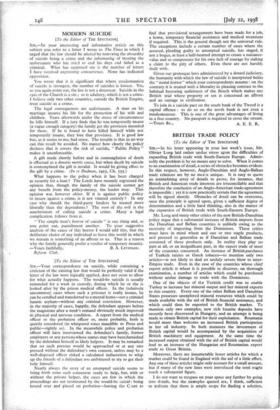[To the Editor of THE SPECTATOR] SIR, —Your correspondence on suicide,
while containing a criticism of the existing law that would be perfectly valid if the letter of the law were logically applied, does not seem to allow for what actually happens. The would-be suicide is usually remanded for a week in custody, during which he or she is looked after by the prison medical officer. In the (relatively uncommon) cases where such a prisoner is really insane, he can be certified and transferred to a mental home—not a criminal lunatic asylum—without any criminal conviction. However, in the majority of cases, happily, the defendant appears before the magistrate after a week's remand obviously much improved in physical and nervous condition. A report from the medical officer or the probation officer or, more probably, both is quietly considered (in whispered tones inaudible to Press and public—rightly so). In the meanwhile police and probation officer will have interviewed the defendant's family, former employers or any persons whose names may have been furnished by the defendant himself as likely helpers. It may be remarked that no such persons would be approached or at any rate pressed without the defendant's own consent, unless may be a well-disposed officer risked a calculated indiscretion to whip up the friends of a defendant too embittered to try to get their help himself.
Nearly always the story of an attempted suicide seems to bring forth some such connexion ready to help, but, with or without the private helper, the cases are few in which the proceedings are not terminated by the would-be suicid: being bound over and placed on probation—leaving the C3urt to find that provisional arrangements have been made for a job, a home, temporary financial assistance and medical treatment if required. This is the general though not the universal rule. The exceptions include a certain number of cases where the accused, pleading guilty to attempted suicide, has staged, if not a bogus, at least a half-hearted attempt to create a nuisance- value and so compensate for his own lack of courage by staking a claim to the pity of others. Even these are not harshly dealt with.
Given our grotesque laws administered by a dotard judiciary, the hUmanity with which the law of suicide is interpreted belies the " moral horror" which your correspondents assume : on the contrary it is treated with a liberality in pleasing contrast to the habitual hectoring unfaimest of the Bench which makes any British trial where property or sex is concerned an affront and an outrage to civilisation.
To join in a suicide pact on the south bank of the Tweed is a capital Offence : to do so on the north bank is not even a misdemeanour. This is one of the great advantages of living in a free country. No passport is required to cross the stream. —Yours &c., A. E. E. R.











































 Previous page
Previous page